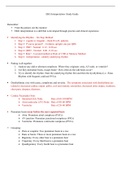Notizen
THE JUDICIARY AUTHORITY
- Kurs
- Hochschule
THE JUDICIAL AUTHORITY MEANS OR INCLUDES THE MAGISTRATE, THE JUDGES OR OTHER PERSONS AUTHORISED UNDER THE LAW TO PERFORM THE FUNCTIONS THE SAME AS OR SIMILAR TO THOSE PERFOMED UNDER SECTION 33 OF THE CONSTITUTION
[ Mehr anzeigen ]




